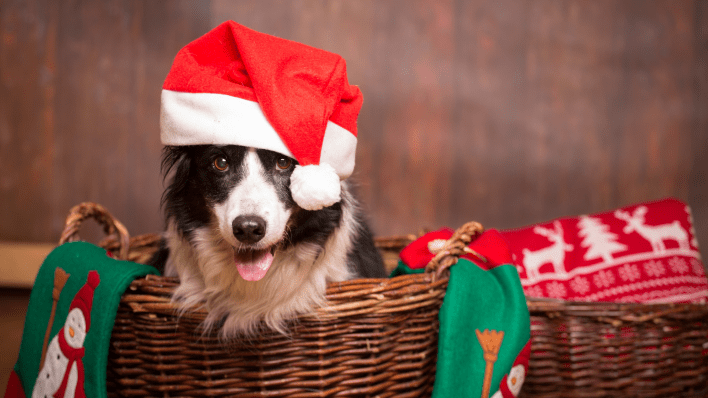Full article with thanks to: thekennelclub.org.uk/health-and-dog-care/health/health-and-care/a-z-of-health-and-care-issues/christamas-dangers
From your dog’s perspective, Christmas is a time of the year when lots of unusual and exciting things are brought into your home, making it a very tempting time for them to get up to all sorts of mischief. Interesting foods, unusual plants and trees, attractive decorations and Christmas presents will all be of great interest to your dog, but some of these things may be harmful if eaten.
Christmas foods
For many, Christmas is a time for sharing mouth-watering and delicious festive foods with friends and family. Although your dog may be high-up there on your list of loved ones, sharing certain human foods with them can make your dog very ill and could even be fatal.
In December, dogs are 75 per cent more likely to be treated by a vet for eating human food that is poisonous to them, compared to any other month of the year, so it’s important to know what foods to keep away from your dog.
Christmas foods that can be harmful to your dog include:
- Chocolate
- Christmas cake, mince pies and Christmas pudding
- Sage and onion stuffing
- Other foods, such as certain nuts, blue cheese, fatty and salty foods etc.
Find out more about Christmas foods that are dangerous to dogs.
Festive plants
Over the Christmas period, as well as tinsel and baubles, many of us tend to decorate our homes with an abundance of festive greenery. We hang wreaths of ivy on our doors, place brightly coloured poinsettia on our windowsills, dangle mistletoe in doorways and bring trees into our homes to adorn with ornaments; but did you know that some of these seasonal plants can make your dog ill?
A number of popular festive plants can be harmful to your dog. These include:
- Poinsettia
- Holly
- Mistletoe
- Ivy
- Potpourri
- Christmas trees
Christmas decorations and presents
With lots of new and exciting things around the house, Christmas can be both an exciting and confusing time for our dogs. With interesting decorations around the home, a tree full of lights and colour, lots of new exciting smells and an array of new presents for the family, it’s easy for your dog to get carried away and be overwhelmed by their natural instincts to explore.
Some Christmas decorations and presents can be harmful to your dog. During the Christmas period watch out for:
- Christmas tree decorations (tinsel, baubles, electric lights and salt dough ornaments)
- Batteries, silica gel and wrapping paper
- Small toys
Find out more about Christmas decorations and toys that can be dangerous to dogs.
Winter dangers
Winter is the season for cold icy weather, dark evening strolls, crunching in the snow and ice and brisk frosty walks. These things may be typical signs that winter is with us, but they also indicate a number of seasonal dangers to our dogs. Going out in the cold is all about being prepared, not only in what we wear, but also in knowing what dangers could lie ahead and how to avoid them.
Antifreeze
Care should be taken when using antifreeze products, which may contain the chemical ethylene glycol, which can be lethal when ingested and its sweet taste may make it tempting for dogs. Antifreeze should therefore be stored in secure containers away from pets. If using antifreeze, make sure that your pets are kept well away and if any is spilt, ensure that it is cleaned up. Effects of poisoning may initially appear as vomiting, diarrhoea, weakness and the dog appearing drunk. An untreated poisoned dog may then appear to recover, but this may be followed by kidney failure.
Prompt treatment is important. If your dog does drink or lick any amount contact your veterinarian immediately.
What to do if you think your dog has eaten something it shouldn’t have
If you think that your dog may have eaten, touched or inhaled something that it shouldn’t have, speak to your vet straight away.
Never try to make your dog sick. Trying to do this can cause other complications, which may harm your dog.
Things to tell your vet
In an emergency you can help your veterinary practice make an informed decision as to whether your dog needs to be treated by them and, if so, what the best treatment would be. Where possible you should provide your veterinary practice with information on:
- What poison you think your dog has been exposed to (e.g. chocolate, ibuprofen etc.). Include any product names, or lists of ingredients if relevant
- How much they may have been exposed to (i.e. 500mg, 500ml, one tablet etc, even approximations may help)
- When your dog was exposed to the poison (i.e. 5 minutes, 5 hours or 5 days ago)
- If your dog has been unwell and, if so, what clinical effects have been seen
It is easier for a vet to care for a poisoned dog if it is treated sooner rather than later. If you are in any doubt, don’t wait for your dog to become unwell before calling for advice.
What to take to your vet
If you do need to take your dog to your veterinary practice, make sure that you take along any relevant packaging, or a sample of the poison, e.g. parts of plant or fungi. Always make sure that you yourself are protected and cannot be poisoned in turn.
How to use this information
The information is intended to be used to prevent poisoning by raising awareness of certain poisons, rather than as a document to be used in an emergency. If you think that your dog has been poisoned, or has come into contact with potentially poisonous substances, contact your local veterinary practice immediately.
Full article with thanks to: thekennelclub.org.uk/health-and-dog-care/health/health-and-care/a-z-of-health-and-care-issues/christamas-dangers
Did you enjoy that? Why not share this article.
We offer free advice on pet travel within or outside the UK, so whether you’re looking for worldwide pet travel services or European travel – we give you our honest, expert advice.
If you choose us for pet travel, don’t worry – your animal companion will be in safe hands from start to finish.
Simply get a quote from us for more information

